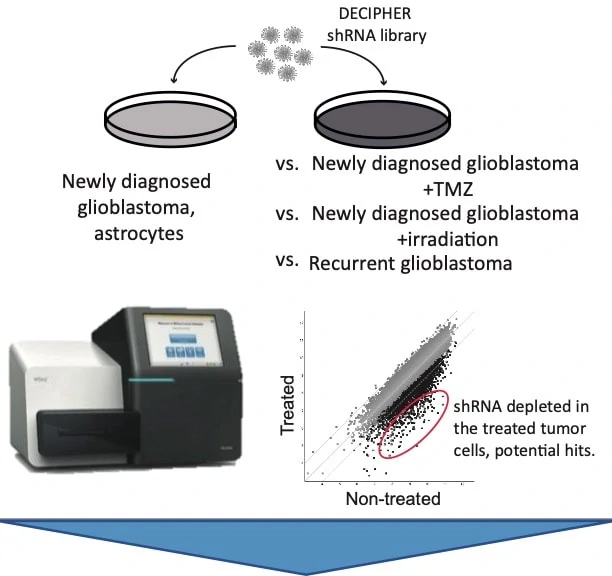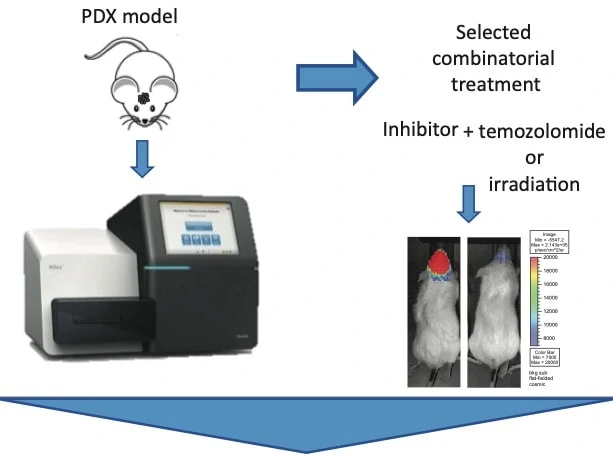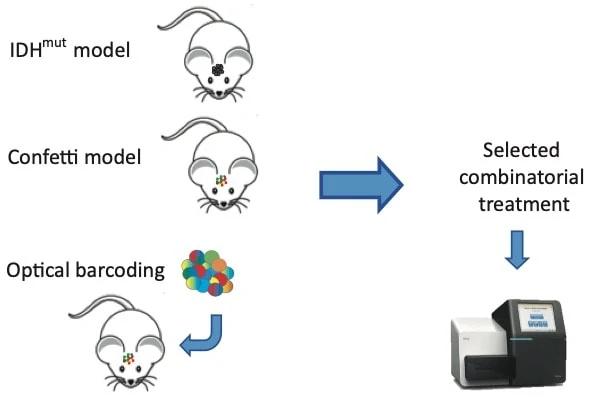Research > Focus A > Work Packages A06
Summary
In this project, loss-of-function screens will be performed to decipher the mechanisms of isocitrate dehydrogenase (IDH) wildtype glioblastoma resistance to alkylating agents and radiotherapy. Presence and activation of these mechanisms will also be confirmed on human glioma tissue, also with regard to intra-tumoral heterogeneity. We aim to overcome current therapy resistance and ultimately recurrence of glioblastoma. The visual abstract below shows the aims and planned tasks of the work package.
Task 1
Identification of drug targets to increase chemo- and radiotherapy sensitivity
Steps / Workflow
- (Epi-)genomic and translational characterization of recurrent and newly diagnosed glioblastoma samples with MGMT methylated or unmethylated promoter.
- Loss-of-function screen with or without temozolomide or high-dose irradiation.
- Selection of the best hits
Task 2
In vitro validation of the identified hits
Steps / Workflow
- Validation via CRISPR/Cas9 system (FACS, caspase assay,…).
- Confirmation of the phenotype using available inhibitors and selection of the most effective and selective one.
- (Epi-)genomic and transcriptional monitoring of the inhibition.
Task 3
In vivo preclinical studies of small-molecule inhibitors to target recurrent glioblastoma and increase current therapies sensitivity
Steps / Workflow
- Establishment of orthotopic PDX models (including monitoring of the genetic changes by high-throughput sequencing)
- In vivo test of the established combinatorial treatments from tasks 1 and 2
Task 4
Assessment of potential clonal selection of the combinatory treatment
Steps / Workflow
Verification of a potential clonal selectivity of the treatment by single-cell sequencing using
- IDH mutant mouse model
- Confetti mouse model
- Optical barcoding

GOIDTS, VIOLAINE, DR. BIOL. HUM.
German Cancer Research Center, Junior Research Group Brain Tumor Translational Targets, Im Neuenheimer Feld 580, 69120 Heidelberg, Germany

SAHM, FELIX, PROF. DR. DR. MED.
University Hospital Heidelberg, Department of Neuropathology, Im Neuenheimer Feld 224, 69120 Heidelberg, Germany
Address
Im Neuenheimer Feld 400
69120 Heidelberg
Themen
Research
- Focus A
- A01: Targeting tumor cell network communication to overcome primary and adaptive resistance in glioblastoma
- A02: Development of a specific combination therapy for histone H3-mutant pediatric glioblastoma
- A03: Deciphering resistance against targeted treatments
- A04: Elucidating tumor-associated microglia interactions in astrocytomas CNS WHO-grade 4
- A05: Predictive biomarkers for MGMT-promoter-methylated glioblastoma (2019 – 2023)
- A06: Resistance mechanisms of glioblastoma against alkylating agents and radiotherapy
- A07: Mapping and targeting neuron-tumor networks to tackle therapy resistance in glioblastoma
- A08: Personalized glioblastoma treatment guided by patient-derived tumor organoids
Research
- Focus B
- B01: Mechanisms of response and resistance to glioma-specific t cells
- B02: DNA mis-match repair regulates immune checkpoint blockade therapy in glioblastoma (2019 – 2023)
- B03: Targeting immunosuppressive programs in isocitrate dehydrogenase mutant gliomas
- B04: Impact of myeloid cells on the adaptive immune response in newly diagnosed and recurrent glioblastomas
- B05: Dissecting the response of glioblastoma and its tumor microenvironment to focused high-dose radiotherapy (2019 – 2023)
- B06: Visualization and characterization of immune responses in H3K27M mutant gliomas
Research
- Focus C
- C01: Comprehensive preclinical pharmacology testing of drugs used for glioblastoma treatment
- C02: Radiomics, radiogenomics and deep-learning in neurooncology
- C03: Imaging immune signatures of glioma response and resistance towards immunotherapy (2019 – 2023)
- C04: Metabolic signaling in glioblastoma: a spatial multi-omics approach
- C05: Overcoming glioma radio-resistance with particle therapy
- C06: Functional characterization of EGFR structural variants associated with long-term survival in glioblastoma, IDH-WT





